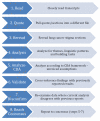Explorations of lung cancer stigma for female long-term survivors
- PMID: 23414179
- PMCID: PMC3683354
- DOI: 10.1111/nin.12024
Explorations of lung cancer stigma for female long-term survivors
Abstract
Lung cancer is the leading cause of cancer death in women, accompanied by greater psychological distress than other cancers. There is minimal but increasing awareness of the impact of lung cancer stigma (LCS) on patient outcomes. LCS is associated with increased symptom burden and decreased quality of life. The purpose of this study was to explore the experience of female long-term lung cancer survivors in the context of LCS and examine how participants discursively adhere to or reject stigmatizing beliefs. Findings situated within Cataldo and colleagues' theoretical model include: (1) addiction and tobacco marketing as possible precursors for LCS, (2) the possible role of expert providers as LCS enhancers, (3) response of overlapping complicated identity shifts, (4) simultaneous rejection and assumption of LCS, and (5) information control via advocacy activities as a LCS mitigation response. These findings expand the current understanding of LCS, and call for future conceptual exploration and theoretical revision, particularly with respect to the possibility of interaction between relevant/related stigma(s) and LCS. As the number of women living with lung cancer increases, with longer survival times, the effect of LCS and other experiences of discrimination on patient outcomes could be substantial.
Keywords: long-term lung cancer; lung cancer; marginalization; oncology; patient outcomes; stigma; survivors; women's health.
© 2013 John Wiley & Sons Ltd.
Figures
References
-
- American Cancer Society [accessed 5 May 2012];Lung cancer (non-small cell) 2012 http://www.cancer.org/Cancer/LungCancer-Non-SmallCell/DetailedGuide/index.
-
- Barry CA, Stevenson FA, Britten N, Barber N, Bradley CP. Giving voice to the lifeworld. More humane, more effective medical care? A qualitative study of doctor-patient communication in general practice. Social Science & Medicine. 2001;53:487–505. - PubMed
-
- Bergart AM. Group work as an antidote to the isolation of bearing an invisible stigma. Social Work with Groups. 2004;26:33–43.
-
- Berger BE, Ferrans CE, Lashley FR. Measuring stigma in people with HIV: Psychometric assessment of the HIV stigma scale. Res Nurs Health. 2001;24:518–529. - PubMed
-
- Bonnie J. Addario Lung Cancer Foundation [accessed 11 Nov 2012];Anyone can get lung cancer - yes, anyone! 2009-2012 http://www.lungcancerfoundation.org/2010/04/07/this-is-the-face-of-lung-...
Publication types
MeSH terms
Grants and funding
LinkOut - more resources
Full Text Sources
Other Literature Sources
Medical
Research Materials
Miscellaneous



